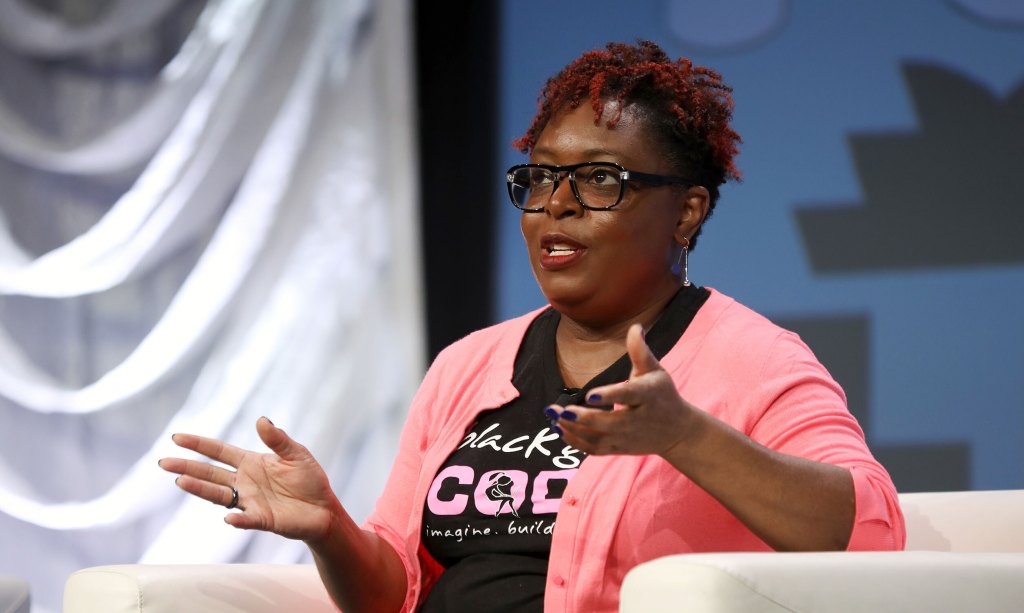Kimberly Bryant is officially out from Black Girls Code, eight months after being indefinitely suspended from the organization that she founded.
In a statement provided to TechCrunch, a Black Girls Code spokesperson writes that it “believes the decision to remove Ms. Bryant as CEO and as a board member is in the best interests of the organization, the girls it serves, its employees, and its donors. BGC has been focusing its efforts on moving forward and expanding on the success of the organization since its inception.”
Bryant filed a federal lawsuit on August 11 alleging wrongful suspension and conflict of interest by board member Heather Hiles. One day later, according to Bryant, her job as a board member and chief executive was terminated. A statement provided to TechCrunch by Bryant and her attorney describes the termination as “an unfortunate culmination of a hostile takeover initiated by Board Member Heather Hiles of the nonprofit that Ms. Bryant created from the ground up, with Hiles’ ultimate desire to gain control of over $30 million in donated philanthropic funds.”
Also named in the suit are Wells Fargo and other individual board members. Hiles and Stacy Brown-Philpot, another board member, did not immediately return TechCrunch’s request for comment. A BGC spokesperson said that “the timing of the Board’s decision had nothing to do with Ms. Bryant’s lawsuit” and that the newest filing makes all the same claims as the state court lawsuits Bryant filed in January.
Bryant’s firing comes after a tense period between Bryant and the board of directors she appointed. In December 2021, Bryant was denied access to her email, which she eventually learned was a result of being indefinitely suspended from the nonprofit organization by her board of directors.
At the time, the board told TechCrunch that Bryant was placed on administrative paid leave to review complaints against her.
Allegations from the board — supported by multiple interviews that TechCrunch conducted with former BGC employees — included Bryant misgendering a staff member and creating a toxic work environment. The board then said that it would form a special committee to investigate the aforementioned allegations but declined to provide a specific timeline.
In Bryant’s legal filing, she claims that the independent investigation cost the nonprofit almost $2 million of donor funds in legal fees. The investigation, led by Aisha Adam of Adam Law, saw 26 witnesses, including Bryant, interviewed over eight months. Bryant’s filing states that Adam “concluded in her presentation to the Board on Friday, August 12th, that none of the witnesses substantiated the special committee’s claims against Bryant.” It’s unclear what claims the special committee set against Bryant, as the board formed a special committee last year in response to claims set forward by former employees of Black Girls Code.
TechCrunch reached out to the lead investigator, Adam, for further comment but did not hear back by time of publication. A Black Girls Code spokesperson declined to comment on the investigation’s findings on the record.
The same day of the presentation, the nonprofit tweeted a statement by Hiles, who said, “Bryant will move on from CEO and board member of BGC. The entire community wishes her well on her next endeavor.”
In response, Bryant tweeted that she had been “wrongly removed” and “without cause or an opportunity to participate in a vote of these actions.” Days later, she tweeted that she was offered no severance, healthcare assistance, or a vacation payout, the latter of which she is entitled to by law in California, where BGC is based. “Sounds like retaliation?” she tweeted regarding the lack of severance.
A Black Girls Code spokesperson said that Ms. Bryant was paid her accrued vacation in accordance with California law, but declined to comment on Bryant’s severance and healthcare assistance allegations.
In December, TechCrunch spoke to five former employees of Black Girls Code. The individuals spoke to TechCrunch anonymously out of fear of retaliation about the state of affairs at BGC. They confirmed the board’s decision to look into the company culture after a summer of rapid turnover, with many individuals citing Bryant as a key reason for parting ways with the nonprofit in the first place.
The former employees said staff churn was largely attributed to Bryant’s leadership style, which they describe was “rooted in fear.” When Bryant was there, they say she would publicly berate managers within meetings, repeatedly calling folks incompetent and urging a manager to “go back to school” when they were unable to deliver on a certain task.
One former employee spoke at the time about the precariousness of the situation. “We know how it is perceived to take down a Black person,” this person said. “And that’s not even what we want to accomplish. We want the organization to be under leadership that could continue the growth of our work.”
Despite believing in the mission, this individual said they finally left the company, partially thanks to consulting a therapist. “To work for an organization that is trying to change how you are treated, valued, and appreciated — and when that doesn’t happen again — it’s really a particular kind of betrayal,” added this person.
Meanwhile, Bryant has continued to receive overwhelming public support, especially from Black women founders.
Martine Pierre, the founder of edtech cannabis company Cannalution, told TechCrunch that the ordeal represented how Black women never receive the same grace as other groups of people and believes if this situation happened to a white, male leader, then the outrage would be “deafening.”
“Her former and current employees deserve to be heard,” Pierre said of those who alleged misconduct from Bryant. “Their allegations, if true, should not be brushed aside; however, Kimberly deserved a fair review process that could have alleviated any previous or current issues within the company. How they terminated her was gross. There was no warning at all. There was no internal investigation.”
Aniesia Williams, the founder of the communication services company AW+CO, said the way Bryant was treated was unacceptable and that many Black founders within the ecosystem can relate to what Bryant is going through. She also said the way the organization removed Bryant sends a bad message to the young girls the foundation has impacted over the years.
“Even the erasure of her on the website, all the while using her daughter’s face everywhere, is a slap in the face,” Williams told TechCrunch. “Black women as a whole can’t make any mistakes without fear of everything we have built being snatched away from us.”
At the same time, Nicole Tinson, the founder of the inclusion networking company HBCU 20 x 20, also felt that Bryant’s abrupt suspension was a disservice to the Black venture community. She said the world needs to see more Black women making a global impact, and Bryant’s removal means it has one less role model.
“There are proper protocols and procedures to address and encourage improvement and efficacy for leaders in any organization, and this was a missed opportunity to move the organization forward in a positive way for the Black girls it serves,” Tinson told TechCrunch.
She hopes there is a positive outcome for all in that “Kimberly is able to continue with her plans for the future.”
“Sometimes we forget that the vision founders have is the guiding light for the future of the communities they serve,” Tinson continued. “The decision to abruptly suspend, then terminate Kimberly Bryant from the organization she founded disrupts and impacts the most important stakeholder — the Black girls she saw the future in.”





